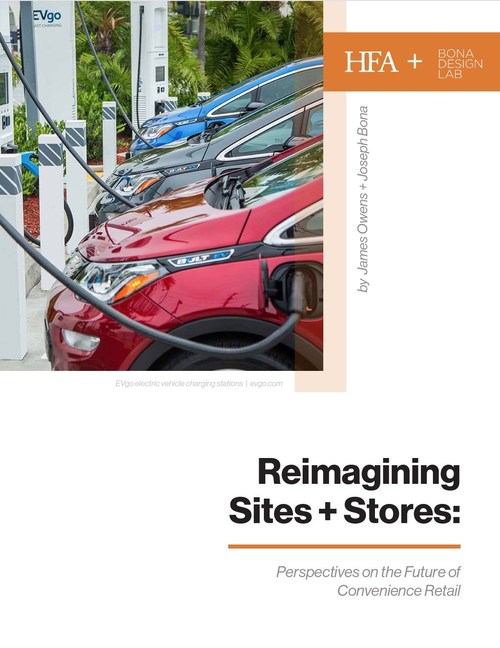NEW YORK and BOSTON, Sept. 28, 2021 /PRNewswire/ — Ramping up local identity is a smart play for c-stores as they adapt to today’s disrupted marketplace, concludes a whitepaper by Bona Design Lab and HFA Architects and Engineers. The newly published, 33-page document is packed with advice for companies seeking to grow market share and cement customer loyalty in the convenience retailing industry.
Amid challenges like channel-blurring and ecommerce commoditization, "many c-store leaders are now refocusing on giving customers the social interaction they’ve been missing, and on making sure their stores convey a strong sense of local identity," write veteran retail designer Joseph Bona, founder and president of Bona Design Lab, and HFA’s James Owens, a licensed architect with two decades of experience in c-store, retail and other sectors. The two firms announced a strategic alliance on Sept. 9.
In the whitepaper (Reimagining Sites & Stores: Perspectives on the Future of Convenience Retail) Bona and Owens dive into five specific areas of opportunity for the global industry: Returning to the Corner Store; Integrating Omnichannel Offerings; Revolutionizing Convenience Foodservice; Anticipating Cultural Shifts; and Capitalizing on Electrification
For example, in the section titled "Returning to the Corner Store," they offer tips for giving individual stores more of "that neighborhood feel." These include:
- Using products and their names, ingredients and flavor profiles to add a local touch. "That could be branded shrimp-and-grits at a store in South Georgia or a locally made, contest-winning cheesesteak in suburban Philly," the authors note.
- Offering opportunities to touch and feel the merchandise. A significant percentage of shoppers will continue to prefer handling products. "Even as you add the likes of contactless vending machines," explain Bona and Owens, "make sure you also have more traditional options such as open chillers filled with fresh-made sandwiches."
- Leveraging interior design. Basic building blocks here include lighting, materials, colors, and graphics, all of which can be deftly used to emphasize human connection and that local touch. "The key is to ‘keep it real’ and strive for a unified and authentic experience," they advise.
- Getting more creative with outdoor spaces. In select markets with larger sites and lower real estate costs, c-stores could use picnic tables, free Wi-Fi, food trucks or other amenities to enliven the experience. "For example," write Bona and Owens, "the store’s location next to a popular, multi-use trail could create an opportunity to offer customers a bike repair station, water fountains for dogs, and an outdoor gourmet coffee stand."
Among topics discussed in the whitepaper’s other sections, the authors cover the role of micro-fulfillment centers in the industry; the need to harmonize site and store design with digital ads, "gamified" rewards programs, and other marketing initiatives; and how to reopen food programs with a stronger emphasis on qualities such as "healthy," "fresh," "creatively packaged and merchandised," "customizable," "novel" and "surprising."
They also take on site and store considerations around electric vehicles and energy-system decarbonization—and even mull the potential effects on c-stores of federal legalization of recreational cannabis.
Bona, who is based in New York, contemplates these opportunities from his decades of experience in retail branding and new-format design, primarily in the c-store/petroleum space; he has worked in 50 countries on five continents. In turn, the Boston-based Owens draws on insights from HFA’s focus on fully integrated architecture, engineering and construction project delivery, with 10,000-plus projects across all 50 states.
While the richly researched report draws on contemporary trends, its authors took pains to depart from existing "future of c-stores" think pieces. "All too often, discussion of the future of c-stores ends up in speculative territory that feels disconnected from the industry’s roots, the realities of the marketplace and what has worked in the past," they write. "[Our] aim was to … stay grounded and look in concrete terms at how new or accelerated trends could translate into concrete action for c-store clients, from the forecourt to the cash wrap."
The full whitepaper is freely available at:
http://bonadesignlab.com/news
or
http://hfa-ae.com/future-convenience-retail
Bona Design Lab and HFA will share a joint exhibit at the National Association of Convenience Stores’ 2021 NACS Show at McCormick Place in Chicago, October 5-8. The firms can be found at Booth 727 in the show’s Expo, which runs from October 6-8.
Media Contacts: At Jaffe Communications: Bill Parness,
320006@email4pr.com
, (732) 673-6852, or Elisa Krantz,
320006@email4pr.com
, (908) 789-0700.
SOURCE Bona Design Lab


